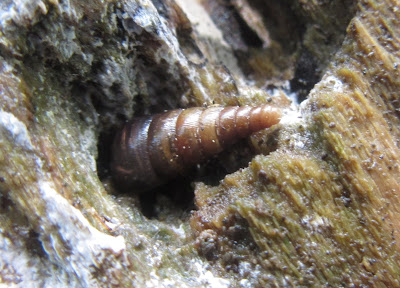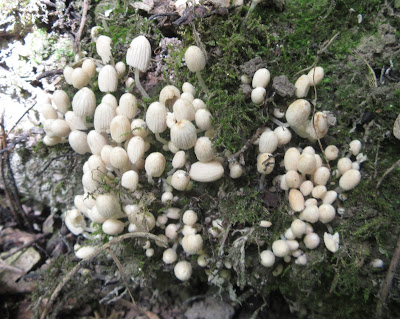On the way we couldn't resist having a look through the field for fossils and treasure. It was harvested when we were there a month ago, but hadn't been ploughed yet. It was still worth a look though as you never know what you might find.
As we got over the brow of the hill we could see we weren't the only ones with the same idea as a man was using a metal detector and had all kinds of kit with him. He was very friendly and chatted to us about some of his finds and told us that a lot of Roman coins had been found around the spring in the past. He showed us what he'd found today and let Bug Mad Girl take some of his treasure home which was very kind.
 |
| A 19th century button from a naval officers uniform |
 |
| Georgian halfpenny - either from George II or George III (you can tell by the direction the face is looking when the coin is cleaned up) |
 |
| Looking down into the base of the spring |
 |
| The bottom of the spring was damp and there were a couple of puddles |
 |
| Looks a bit like a woodlouse, but with a tapering head - really not sure what these were |
 |
| These looked like tiny white centipedes, but I believe they are actually called scutigerella immaculate and have 12 pairs of legs. They eat decaying vegetation and are often found in compost heaps |
 |
| Door snail |
 |
| Maybe a glistening inkcap, covered in scales |
 |
| Dead man's fingers growing underneath a log |
 |
| Fairy inkcaps just starting to appear |
Outside the spring there were red kites flying over the fields. They were also looking for treasure, but theirs was the wormy variety! Occasionally they'd land for a minute to get a worm, then they'd be off again. They seemed quite annoyed that a flock of seagulls were sitting in one corner of the field and every now and then they'd dive bomb them making the whole lot fly up briefly before landing again.
 |
| Red kites were flying low over the fields |
 |
| and harassing a few seagulls! |
We also noticed we were being watched by a small flock of birds on the wires, that I've been told were linnets. They seemed to be enjoying watching us!
When we got home we cleaned up the treasure - a naval uniform button, a Georgian coin and a small 17th century button.
The button was from a naval officers uniform and had a crown and anchor on it. The roped edge shows it was from an offices uniform as the edge would be plain otherwise. The shape of the crown shows it's Victorian so comes from before 1901.
The coin was a halfpenny from the reign of George II, between 1727 and 1760. It's well worn but you can still make out the face on the coin, which is facing left making George II (George III faces right). Brittania would have been on the back of the coin, but it was too worn to make her out.
There are always surprises on our trips to Pyrtle Spring but we really weren't expecting to come home with real treasure! Perhaps one of our ancestors dropped a button or coin when they were by the spring!
Many thanks to the very kind treasure hunter who spent time talking to us and gave us some of his finds.









The flock of small birds look a bit like linnets, but it is quite hard to make out. Were they finch sized or pigeon sized? Also, your red kite mobbing the gulls reminds me of the marsh harriers being mobbed by crows today at Strumpshaw. I'm also glad to see my first ever water shrew too!!!
ReplyDeleteThey were definitely finch sized. When we were there I thought they might be goldfinches, but when we got home and I zoomed in on the photo I changed my mind. I've added a photo above if you want to take a look.
ReplyDeleteWell done on seeing a water shrew!
Yeah, they're linnets.They are lovely birds to see.
DeleteThanks Sean, I'll update the post.
Delete